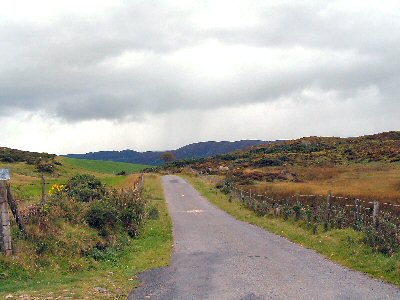Smuggling reached a peak in the War years. The British enforced a blockade of the ports of the neutral Irish Free State and consequently there were many items available to us in the North that were not for sale in the South. It cut the other way too! Things were not requisitioned there for the war effort. For example they had plenty of cloth and the Dromintee pahvee came into his own.
We had blackout blinds at home. The government wanted people to use them so that Jerry would not know where to drop his bombs. The cloth was exempt from the coupon system and could be purchased in bulk. Jim Murphy, then pahvee and later independent Councillor on Newry & Mourne District Council, took a sample to a tailor he knew in New Street, Dundalk and asked could he use the material. Ideal material for suit lining, Jim quickly established a lucrative, if unofficial ‘export’ business.
Gene Magennis remembers going South to purchase a new suit of clothes. It would be subject to excise duty at the ‘barrier’ so one had to have one’s preparations complete well in time. Gene had it thought out. If he wore the suit but carried his discarded clothes in a bundle, they would catch on. Better to go South in his oldest rags that he could discard; then the suit he was wearing would not come under suspicion. The changeover was made in the moving car, the old clothes recklessly discarded through the open window. It was only when they neared the Customs Post, and he had thrown away all the old and dressed in most of the new suit, that he discovered he had not been supplied with trousers as part of his new suit!
My grandfather’s smuggling enterprise was a little more sophisticated. He had sent his eldest son to farm a few acres just the other side of the border in Dungooley. You’ve met Petie a few times already! It was his job to identify and purchase small but valuable items in Dundalk that would retail in Newry for profit. Jack constructed hidden compartments in his trap, under the seat that was usually filled with an innocent young daughter (my mother-to-be for example). In Dundalk Jack would purchase the iron he required for his farrier business for a month, pick up the bottles of whiskey etc. from Petie’s farm, sell the latter off to Newry publicans and other retailers and proceed home by the Newto’n Road. The legitimate part, importing iron to shoe horses in the North, was obviously smiled upon by Northern authorities who thereby thought the South was making an unwilling contribution to ‘normality’ in the North! This ruse deflected customs men’s suspicions and the trade flourished.
Mick Moore raised a large family in a roadside house in Dromalane. He would participate in a little smuggling using the Fathom Line to Omeath. He continued to do so even after the road was ‘permanently’ closed with large spikes. The pony would be unhitched and led through: then the trap would be upended and slid through; and finally the righted trap would again be hitched to the pony. Just a minor inconvenience!
Even cyclists, who like everyone else would be searched, could participate in the cross-border trade. Alcohol and cigarettes were the ‘high-profit’ items. The saddle could be loosened and removed with a spanner. Then the cigarette packets opened and their contents spilled into the hollow tube, before the saddle was replaced. Able to smuggle a few packets at a time, it made the cycle ride to Omeath both enjoyable and profitable!
